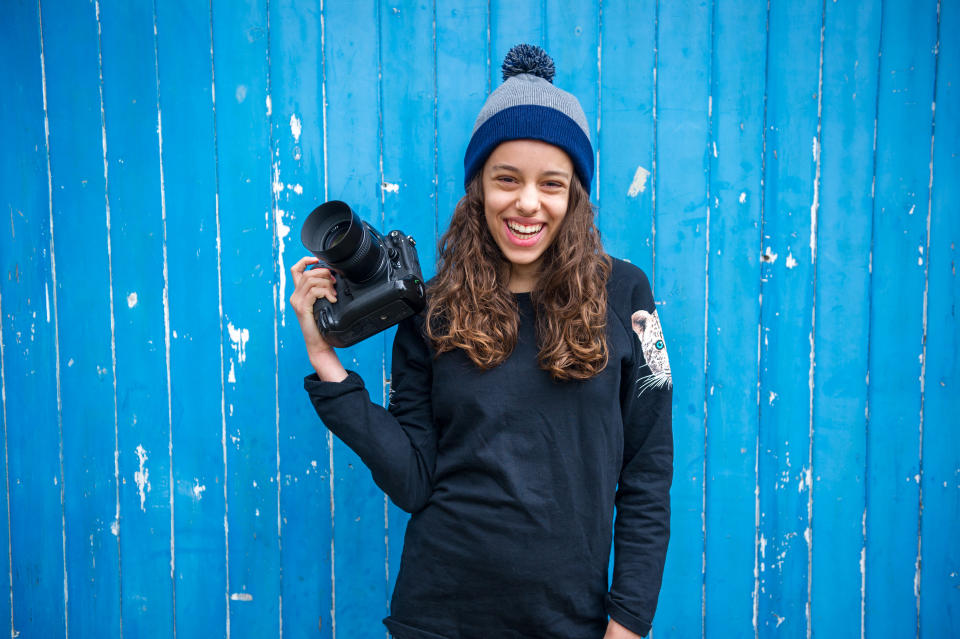'Get snapping': Why Rankin wants children to take photos to improve their mental health

He has photographed everyone from the Queen to Madonna and David Bowie and worked on memorable advertising campaigns for the likes of Dove, Diesel and Aston Martin.
But British photographer Rankin insists it’s not only the final image that can have an everlasting impact on people – the simple act of taking a picture can provide an enormous feel-good factor.
“When I take photos, it can make me feel better,” he says. “When I really focus on taking photographs it can stop me worrying, and we can all feel like that sometimes.
“We see so many pictures today that just aren’t real, they’re too perfect, too focused on things and products and when we look at them it can be really tough on our minds. If you’re sometimes feeling a bit down or anxious, photographs can help you communicate in a way that can be hard to put into words.”
Read more: Celebrities help promote new guidance for parents to support child mental health
It’s one of the reasons why he – and other leading photographers – have put their names to an exciting new project aimed at 11-18 year olds. Called ‘Show and Tell’ it hopes to encourage youngsters to use photography to support their mental health during the global pandemic.
Problems such as anxiety and self-harm were already on the rise before lockdown, with one in eight children and young people estimated to have a mental health condition.
But a study in July in The Lancet Psychiatry found that children’s mental health deteriorated most during lockdown compared with other age groups. Worryingly, the number of young children contacting Childline for suicide counselling in the UK has risen by 20 per cent this year.
Now, as half-term beckons and regional lockdowns and coronavirus tier restrictions come into force, organisers want young people to have a ‘safe space’ to express their thoughts and emotions in these strange times.
“We built Show and Tell because kids were enduring 2020 in silence – and we really need to know how they are coping so that we can better support them now and in the future,” says Steve Wallington, one of the co-founders of the non-profit organisation The Photography Movement, which is behind the project.
“During lockdown, I was delivering food parcels to families and I came across children who hadn’t even left their house for five months. The mental health impact of the lockdown is huge.
“But photography can be enormously therapeutic. When you’re taking a photograph, you’re putting yourself in the moment. You’re cut off from the world around you. It slows your breathing down, it’s meditative, a form of escapism.
Read more: Former TOWIE star Lauren Pope has maternity photography lesson, ahead of first child's arrival
“The feedback we’ve had from youngsters – and teachers – about the workshops we’ve done already has been incredibly positive. This is a way for children to talk about isolation or loneliness and really express themselves in ways they may not have been able to do before.”
The project is a deeply personal one for both Steve and his co-founder Scott Shillum.
“Originally we set up The Photography Movement because Scott lost his twin brother to suicide and later, another friend in his 40s took his own life too,” says Steve. “We did an exhibition about grief and what it means to be a modern man and raised £30,000 for a mental health charity.
“But then I was lecturing in a college and a young student mentioned that she had lost two friends at the age of 14 to suicide and I thought: ‘Right, we need to be doing something for the kids’ – so I proposed an idea for filmed workshops.”

Freely available online, the four workshop films are taught by four professional photographers who set tasks that teach youngsters about the positive link between photography and mental health.
Portrait photographer Emma Hardy sets a task to use colour and black and white images to define a mood while reportage photographer Francis Augusto tasks would-be snappers with finding a family member and taking pictures of them as they’re having a conversation.
Meanwhile, Rankin asks youngsters to look at his own back catalogue of projects and explore how his photographs make them feel. One of those projects – that resonated with the 54-year-old photographer himself – was one in which he photographed 15 teenagers and asked them to edit and filter them with digital artistry until they were ‘social media ready’.
“On these selfie apps, people love to mimic their idols, making their eyes bigger, their nose smaller and their skin brighter and all just for the ‘likes’,” he says. “It’s just another reason why we are living in a world of FOMO (fear of missing out), sadness, increased anxiety and snap chat dysmorphia.
“It’s time to acknowledge the damaging effects that social media has on people’s self-image.”
Each workshop can be led by a teacher, parent or carer and youngsters will be asked to visualise their emotions and answer a simple question: ‘How Are You Feeling?’
Once they’ve taken their shot, they can submit their photograph via Instagram on @showandtellphoto or tag #showandtellphoto in their own post and their shot will be submitted for inclusion in a national photography exhibition that will take place in 2021.
But while the exhibition marks the finale of the project, it's by no means the ultimate goal.
“Most of all right now we would like to drive awareness that there is a trust space where young people can go to improve their photography, understand the impact of images and express how they are feeling,’ says Wallington.
As Rankin says: “Good luck... and get snapping.”

 Yahoo Finance
Yahoo Finance 